Foreign Investment in Australian Agribusiness: A Taxation Law Analysis
VerifiedAdded on 2023/03/23
|12
|2816
|76
Report
AI Summary
This report examines the implications of Australian taxation laws on foreign investment within the agribusiness sector. It begins by defining 'foreigners' under Australian taxation law, highlighting surcharges and conditions affecting foreign entities. The report contrasts tax treatments between foreign and domestic investments, noting that foreign investors face challenges such as land tax, withholding taxes, and stamp duties, which can impede profitability and sustainability. These taxes create complications, including incentives to shift profits and limit foreign direct investment. The report concludes with recommendations for harmonizing land tax and abolishing stamp duty, advocating for a review of managed investment trust tax rates to balance national interests with the need to attract foreign capital. Desklib provides access to this and other solved assignments for students.

Running head: TAX 1
Australian taxation law
Name
Affiliation
Date
Australian taxation law
Name
Affiliation
Date
Paraphrase This Document
Need a fresh take? Get an instant paraphrase of this document with our AI Paraphraser
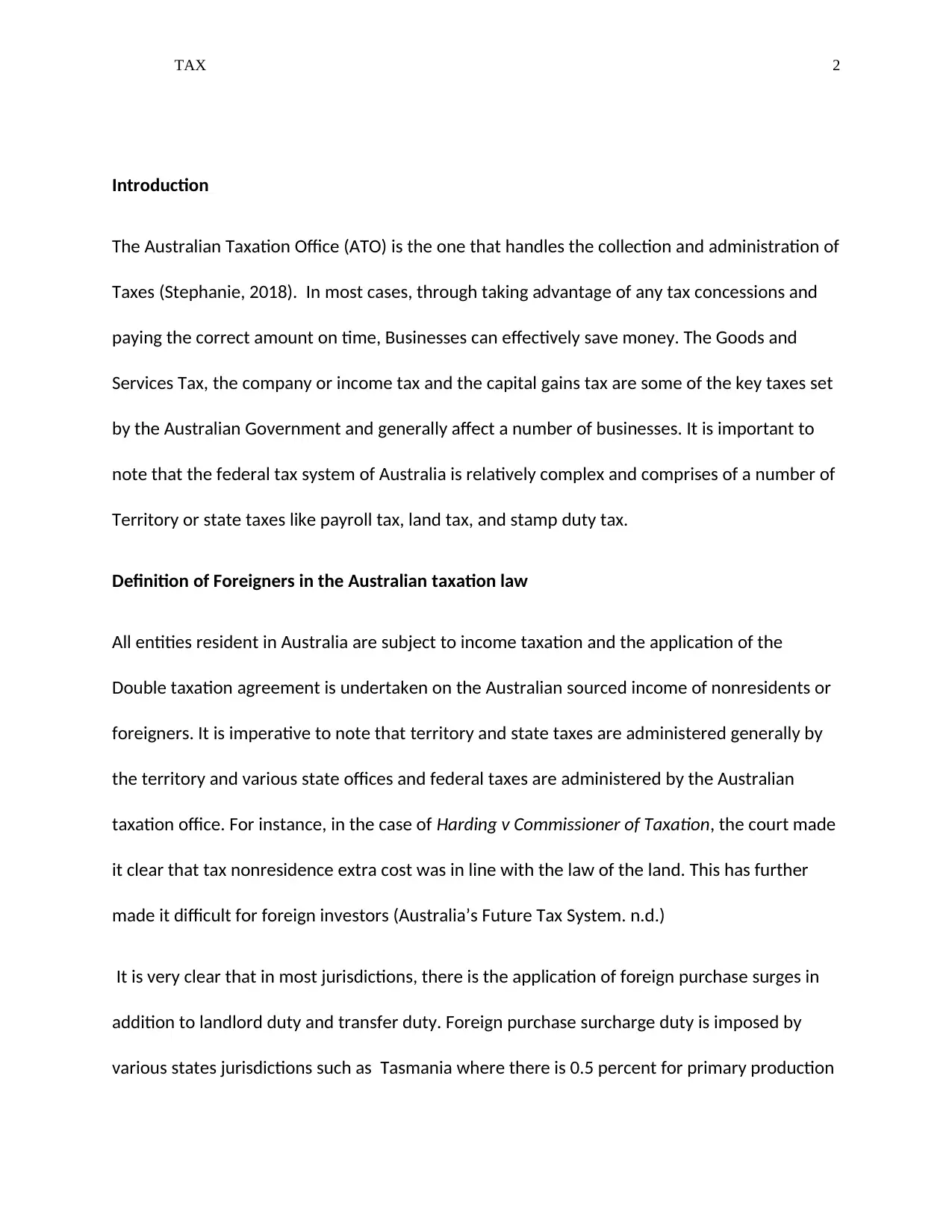
TAX 2
Introduction
The Australian Taxation Office (ATO) is the one that handles the collection and administration of
Taxes (Stephanie, 2018). In most cases, through taking advantage of any tax concessions and
paying the correct amount on time, Businesses can effectively save money. The Goods and
Services Tax, the company or income tax and the capital gains tax are some of the key taxes set
by the Australian Government and generally affect a number of businesses. It is important to
note that the federal tax system of Australia is relatively complex and comprises of a number of
Territory or state taxes like payroll tax, land tax, and stamp duty tax.
Definition of Foreigners in the Australian taxation law
All entities resident in Australia are subject to income taxation and the application of the
Double taxation agreement is undertaken on the Australian sourced income of nonresidents or
foreigners. It is imperative to note that territory and state taxes are administered generally by
the territory and various state offices and federal taxes are administered by the Australian
taxation office. For instance, in the case of Harding v Commissioner of Taxation, the court made
it clear that tax nonresidence extra cost was in line with the law of the land. This has further
made it difficult for foreign investors (Australia’s Future Tax System. n.d.)
It is very clear that in most jurisdictions, there is the application of foreign purchase surges in
addition to landlord duty and transfer duty. Foreign purchase surcharge duty is imposed by
various states jurisdictions such as Tasmania where there is 0.5 percent for primary production
Introduction
The Australian Taxation Office (ATO) is the one that handles the collection and administration of
Taxes (Stephanie, 2018). In most cases, through taking advantage of any tax concessions and
paying the correct amount on time, Businesses can effectively save money. The Goods and
Services Tax, the company or income tax and the capital gains tax are some of the key taxes set
by the Australian Government and generally affect a number of businesses. It is important to
note that the federal tax system of Australia is relatively complex and comprises of a number of
Territory or state taxes like payroll tax, land tax, and stamp duty tax.
Definition of Foreigners in the Australian taxation law
All entities resident in Australia are subject to income taxation and the application of the
Double taxation agreement is undertaken on the Australian sourced income of nonresidents or
foreigners. It is imperative to note that territory and state taxes are administered generally by
the territory and various state offices and federal taxes are administered by the Australian
taxation office. For instance, in the case of Harding v Commissioner of Taxation, the court made
it clear that tax nonresidence extra cost was in line with the law of the land. This has further
made it difficult for foreign investors (Australia’s Future Tax System. n.d.)
It is very clear that in most jurisdictions, there is the application of foreign purchase surges in
addition to landlord duty and transfer duty. Foreign purchase surcharge duty is imposed by
various states jurisdictions such as Tasmania where there is 0.5 percent for primary production
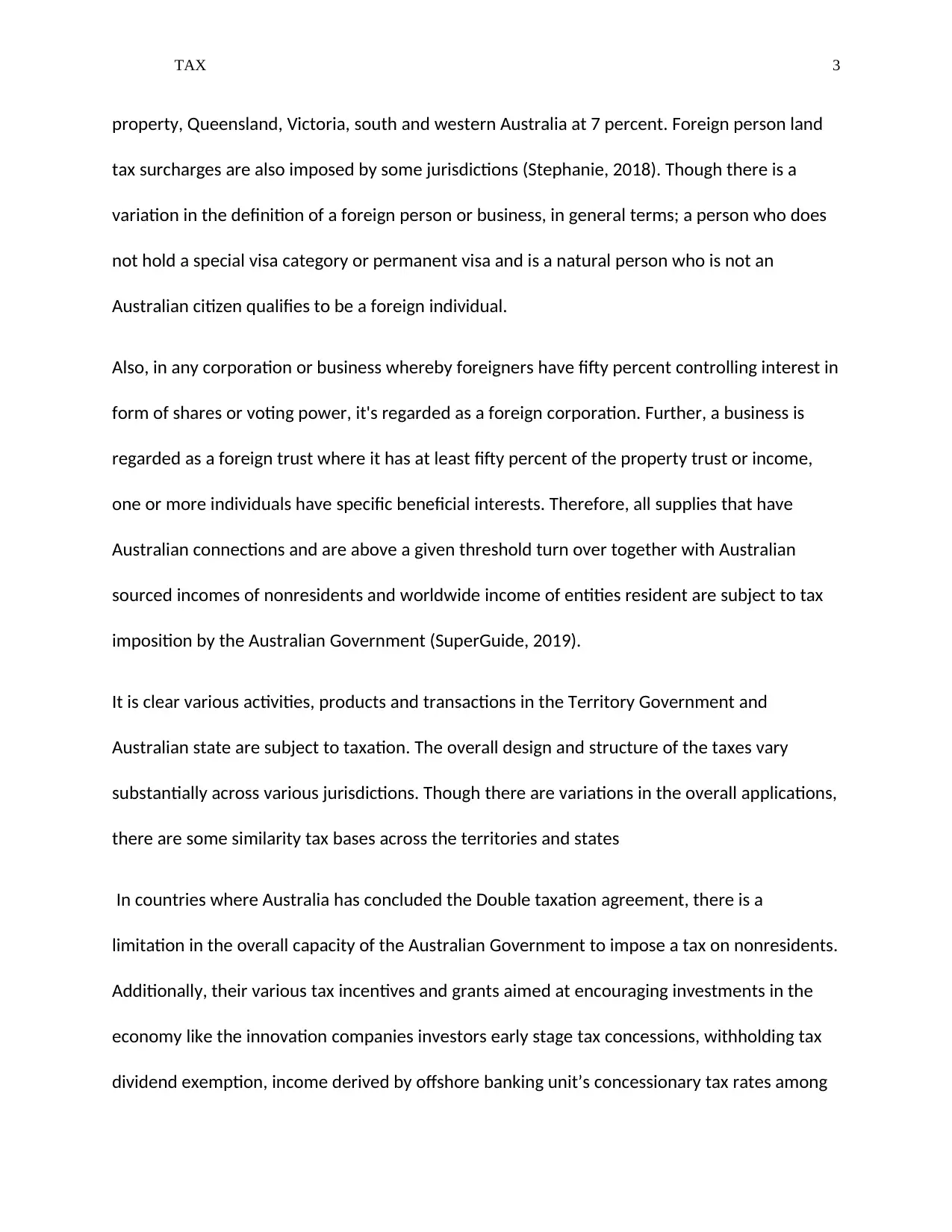
TAX 3
property, Queensland, Victoria, south and western Australia at 7 percent. Foreign person land
tax surcharges are also imposed by some jurisdictions (Stephanie, 2018). Though there is a
variation in the definition of a foreign person or business, in general terms; a person who does
not hold a special visa category or permanent visa and is a natural person who is not an
Australian citizen qualifies to be a foreign individual.
Also, in any corporation or business whereby foreigners have fifty percent controlling interest in
form of shares or voting power, it's regarded as a foreign corporation. Further, a business is
regarded as a foreign trust where it has at least fifty percent of the property trust or income,
one or more individuals have specific beneficial interests. Therefore, all supplies that have
Australian connections and are above a given threshold turn over together with Australian
sourced incomes of nonresidents and worldwide income of entities resident are subject to tax
imposition by the Australian Government (SuperGuide, 2019).
It is clear various activities, products and transactions in the Territory Government and
Australian state are subject to taxation. The overall design and structure of the taxes vary
substantially across various jurisdictions. Though there are variations in the overall applications,
there are some similarity tax bases across the territories and states
In countries where Australia has concluded the Double taxation agreement, there is a
limitation in the overall capacity of the Australian Government to impose a tax on nonresidents.
Additionally, their various tax incentives and grants aimed at encouraging investments in the
economy like the innovation companies investors early stage tax concessions, withholding tax
dividend exemption, income derived by offshore banking unit’s concessionary tax rates among
property, Queensland, Victoria, south and western Australia at 7 percent. Foreign person land
tax surcharges are also imposed by some jurisdictions (Stephanie, 2018). Though there is a
variation in the definition of a foreign person or business, in general terms; a person who does
not hold a special visa category or permanent visa and is a natural person who is not an
Australian citizen qualifies to be a foreign individual.
Also, in any corporation or business whereby foreigners have fifty percent controlling interest in
form of shares or voting power, it's regarded as a foreign corporation. Further, a business is
regarded as a foreign trust where it has at least fifty percent of the property trust or income,
one or more individuals have specific beneficial interests. Therefore, all supplies that have
Australian connections and are above a given threshold turn over together with Australian
sourced incomes of nonresidents and worldwide income of entities resident are subject to tax
imposition by the Australian Government (SuperGuide, 2019).
It is clear various activities, products and transactions in the Territory Government and
Australian state are subject to taxation. The overall design and structure of the taxes vary
substantially across various jurisdictions. Though there are variations in the overall applications,
there are some similarity tax bases across the territories and states
In countries where Australia has concluded the Double taxation agreement, there is a
limitation in the overall capacity of the Australian Government to impose a tax on nonresidents.
Additionally, their various tax incentives and grants aimed at encouraging investments in the
economy like the innovation companies investors early stage tax concessions, withholding tax
dividend exemption, income derived by offshore banking unit’s concessionary tax rates among
⊘ This is a preview!⊘
Do you want full access?
Subscribe today to unlock all pages.

Trusted by 1+ million students worldwide
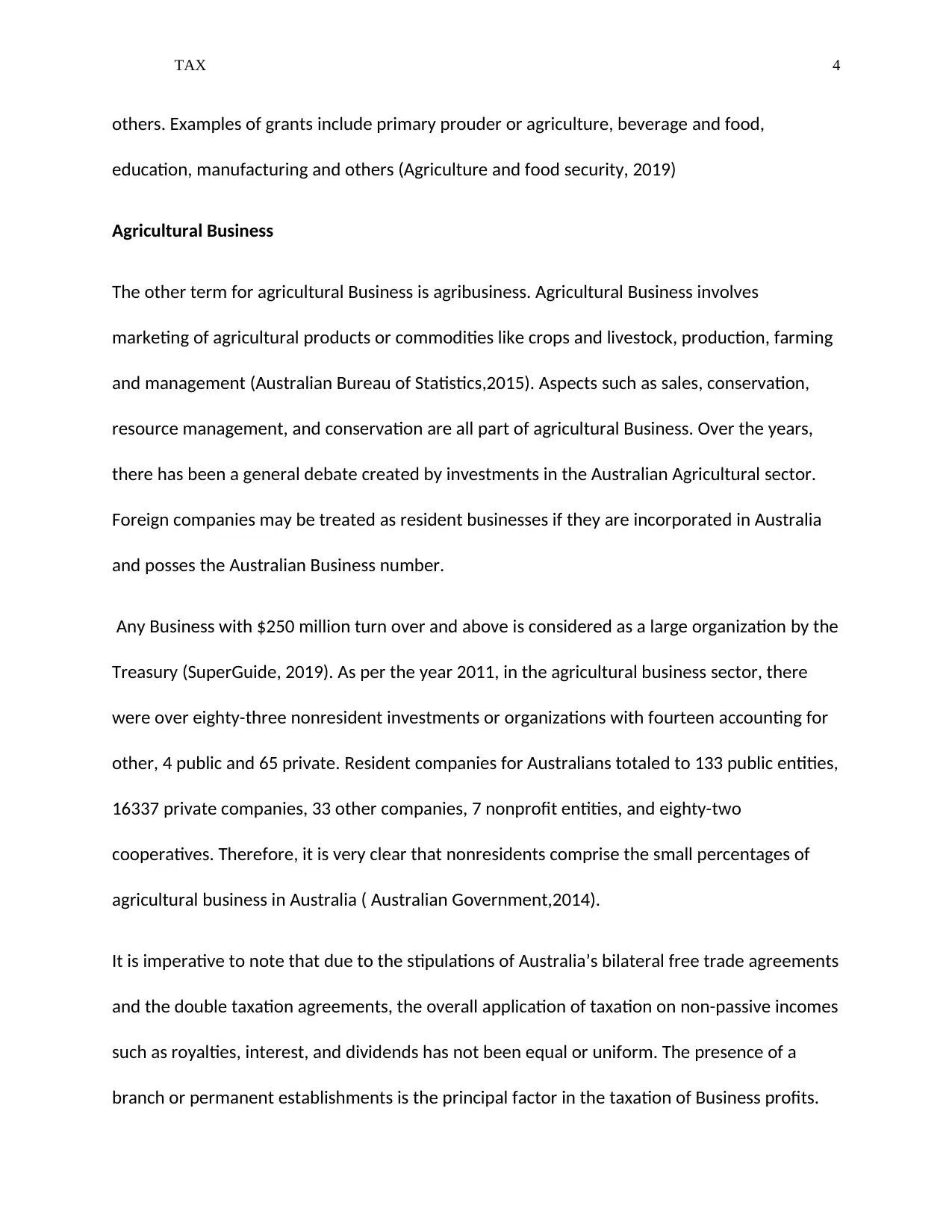
TAX 4
others. Examples of grants include primary prouder or agriculture, beverage and food,
education, manufacturing and others (Agriculture and food security, 2019)
Agricultural Business
The other term for agricultural Business is agribusiness. Agricultural Business involves
marketing of agricultural products or commodities like crops and livestock, production, farming
and management (Australian Bureau of Statistics,2015). Aspects such as sales, conservation,
resource management, and conservation are all part of agricultural Business. Over the years,
there has been a general debate created by investments in the Australian Agricultural sector.
Foreign companies may be treated as resident businesses if they are incorporated in Australia
and posses the Australian Business number.
Any Business with $250 million turn over and above is considered as a large organization by the
Treasury (SuperGuide, 2019). As per the year 2011, in the agricultural business sector, there
were over eighty-three nonresident investments or organizations with fourteen accounting for
other, 4 public and 65 private. Resident companies for Australians totaled to 133 public entities,
16337 private companies, 33 other companies, 7 nonprofit entities, and eighty-two
cooperatives. Therefore, it is very clear that nonresidents comprise the small percentages of
agricultural business in Australia ( Australian Government,2014).
It is imperative to note that due to the stipulations of Australia’s bilateral free trade agreements
and the double taxation agreements, the overall application of taxation on non-passive incomes
such as royalties, interest, and dividends has not been equal or uniform. The presence of a
branch or permanent establishments is the principal factor in the taxation of Business profits.
others. Examples of grants include primary prouder or agriculture, beverage and food,
education, manufacturing and others (Agriculture and food security, 2019)
Agricultural Business
The other term for agricultural Business is agribusiness. Agricultural Business involves
marketing of agricultural products or commodities like crops and livestock, production, farming
and management (Australian Bureau of Statistics,2015). Aspects such as sales, conservation,
resource management, and conservation are all part of agricultural Business. Over the years,
there has been a general debate created by investments in the Australian Agricultural sector.
Foreign companies may be treated as resident businesses if they are incorporated in Australia
and posses the Australian Business number.
Any Business with $250 million turn over and above is considered as a large organization by the
Treasury (SuperGuide, 2019). As per the year 2011, in the agricultural business sector, there
were over eighty-three nonresident investments or organizations with fourteen accounting for
other, 4 public and 65 private. Resident companies for Australians totaled to 133 public entities,
16337 private companies, 33 other companies, 7 nonprofit entities, and eighty-two
cooperatives. Therefore, it is very clear that nonresidents comprise the small percentages of
agricultural business in Australia ( Australian Government,2014).
It is imperative to note that due to the stipulations of Australia’s bilateral free trade agreements
and the double taxation agreements, the overall application of taxation on non-passive incomes
such as royalties, interest, and dividends has not been equal or uniform. The presence of a
branch or permanent establishments is the principal factor in the taxation of Business profits.
Paraphrase This Document
Need a fresh take? Get an instant paraphrase of this document with our AI Paraphraser
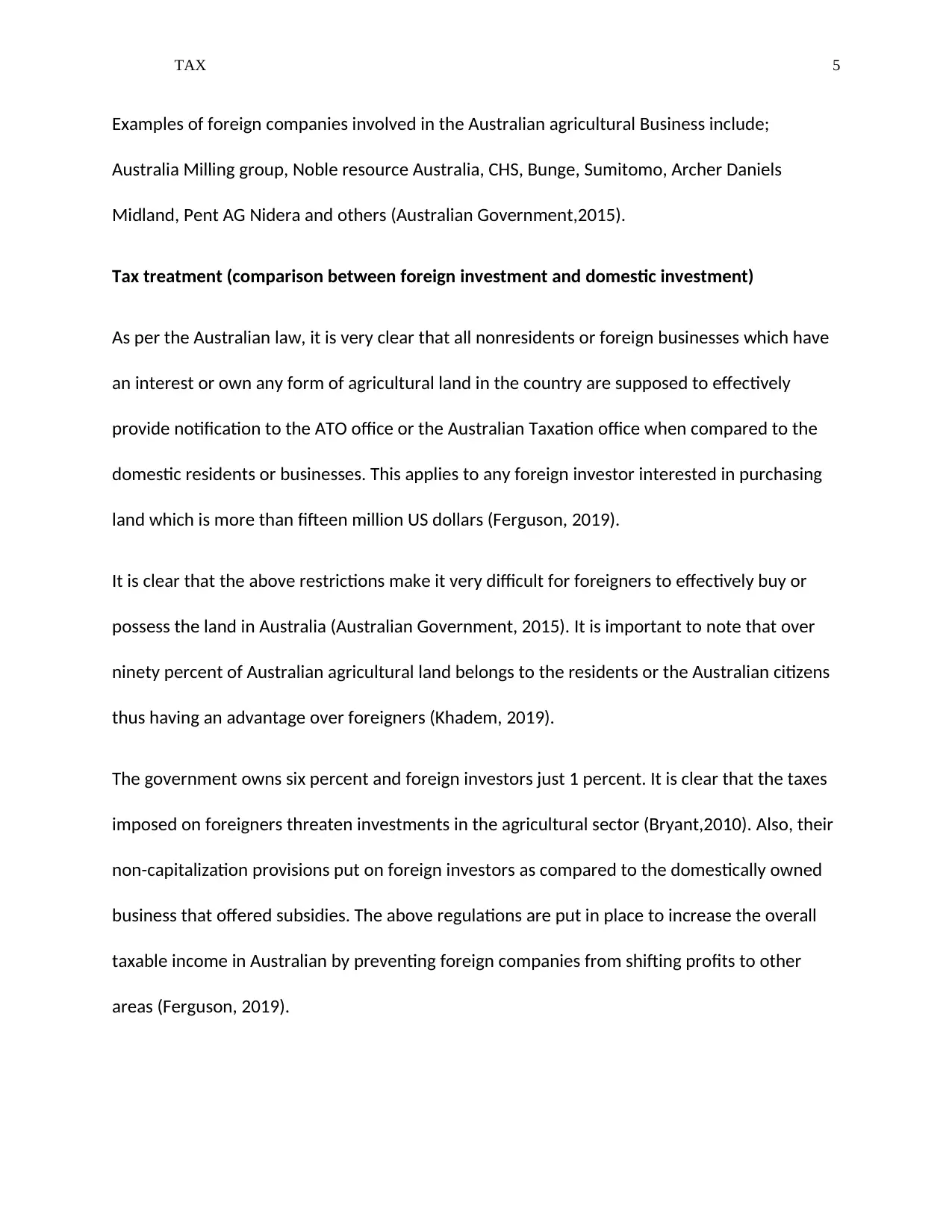
TAX 5
Examples of foreign companies involved in the Australian agricultural Business include;
Australia Milling group, Noble resource Australia, CHS, Bunge, Sumitomo, Archer Daniels
Midland, Pent AG Nidera and others (Australian Government,2015).
Tax treatment (comparison between foreign investment and domestic investment)
As per the Australian law, it is very clear that all nonresidents or foreign businesses which have
an interest or own any form of agricultural land in the country are supposed to effectively
provide notification to the ATO office or the Australian Taxation office when compared to the
domestic residents or businesses. This applies to any foreign investor interested in purchasing
land which is more than fifteen million US dollars (Ferguson, 2019).
It is clear that the above restrictions make it very difficult for foreigners to effectively buy or
possess the land in Australia (Australian Government, 2015). It is important to note that over
ninety percent of Australian agricultural land belongs to the residents or the Australian citizens
thus having an advantage over foreigners (Khadem, 2019).
The government owns six percent and foreign investors just 1 percent. It is clear that the taxes
imposed on foreigners threaten investments in the agricultural sector (Bryant,2010). Also, their
non-capitalization provisions put on foreign investors as compared to the domestically owned
business that offered subsidies. The above regulations are put in place to increase the overall
taxable income in Australian by preventing foreign companies from shifting profits to other
areas (Ferguson, 2019).
Examples of foreign companies involved in the Australian agricultural Business include;
Australia Milling group, Noble resource Australia, CHS, Bunge, Sumitomo, Archer Daniels
Midland, Pent AG Nidera and others (Australian Government,2015).
Tax treatment (comparison between foreign investment and domestic investment)
As per the Australian law, it is very clear that all nonresidents or foreign businesses which have
an interest or own any form of agricultural land in the country are supposed to effectively
provide notification to the ATO office or the Australian Taxation office when compared to the
domestic residents or businesses. This applies to any foreign investor interested in purchasing
land which is more than fifteen million US dollars (Ferguson, 2019).
It is clear that the above restrictions make it very difficult for foreigners to effectively buy or
possess the land in Australia (Australian Government, 2015). It is important to note that over
ninety percent of Australian agricultural land belongs to the residents or the Australian citizens
thus having an advantage over foreigners (Khadem, 2019).
The government owns six percent and foreign investors just 1 percent. It is clear that the taxes
imposed on foreigners threaten investments in the agricultural sector (Bryant,2010). Also, their
non-capitalization provisions put on foreign investors as compared to the domestically owned
business that offered subsidies. The above regulations are put in place to increase the overall
taxable income in Australian by preventing foreign companies from shifting profits to other
areas (Ferguson, 2019).
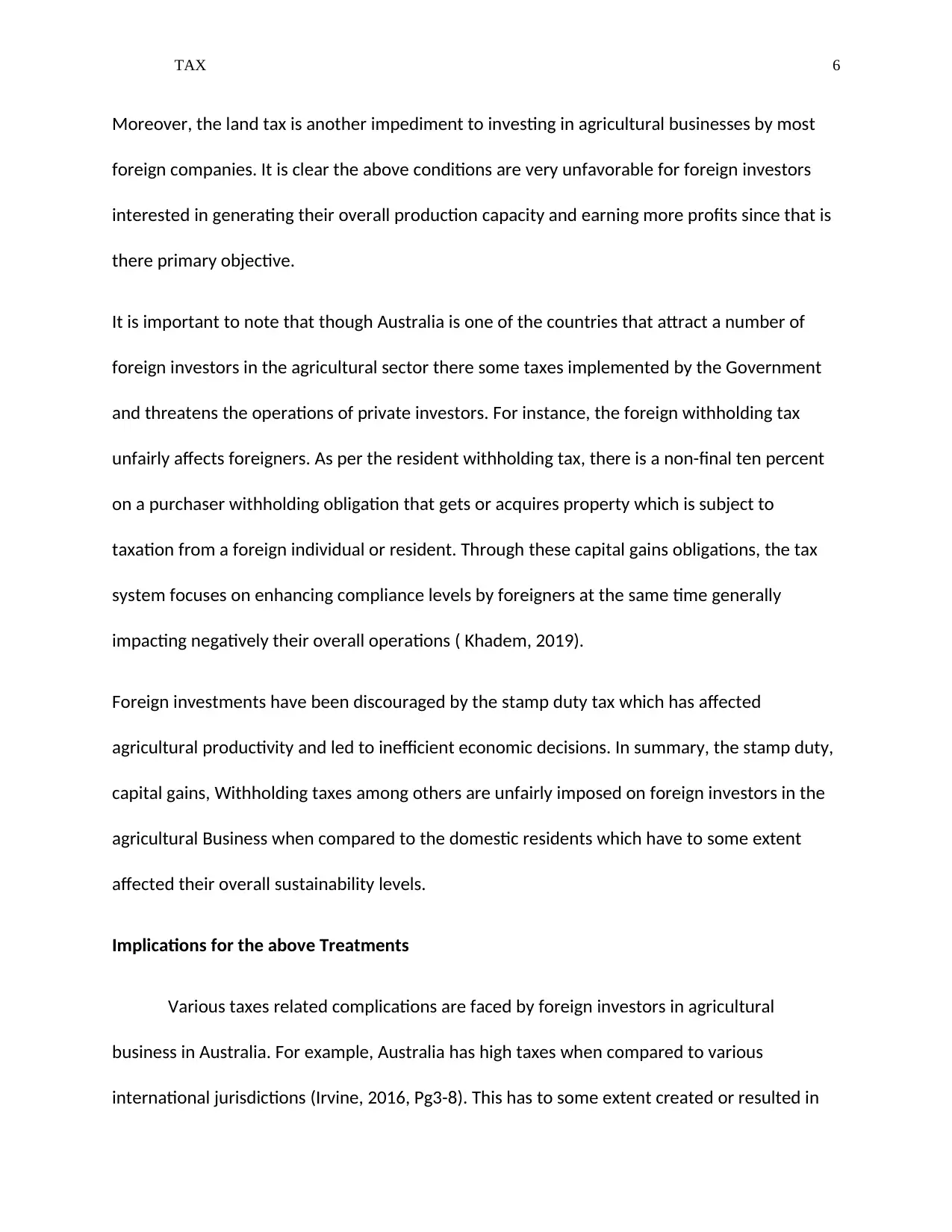
TAX 6
Moreover, the land tax is another impediment to investing in agricultural businesses by most
foreign companies. It is clear the above conditions are very unfavorable for foreign investors
interested in generating their overall production capacity and earning more profits since that is
there primary objective.
It is important to note that though Australia is one of the countries that attract a number of
foreign investors in the agricultural sector there some taxes implemented by the Government
and threatens the operations of private investors. For instance, the foreign withholding tax
unfairly affects foreigners. As per the resident withholding tax, there is a non-final ten percent
on a purchaser withholding obligation that gets or acquires property which is subject to
taxation from a foreign individual or resident. Through these capital gains obligations, the tax
system focuses on enhancing compliance levels by foreigners at the same time generally
impacting negatively their overall operations ( Khadem, 2019).
Foreign investments have been discouraged by the stamp duty tax which has affected
agricultural productivity and led to inefficient economic decisions. In summary, the stamp duty,
capital gains, Withholding taxes among others are unfairly imposed on foreign investors in the
agricultural Business when compared to the domestic residents which have to some extent
affected their overall sustainability levels.
Implications for the above Treatments
Various taxes related complications are faced by foreign investors in agricultural
business in Australia. For example, Australia has high taxes when compared to various
international jurisdictions (Irvine, 2016, Pg3-8). This has to some extent created or resulted in
Moreover, the land tax is another impediment to investing in agricultural businesses by most
foreign companies. It is clear the above conditions are very unfavorable for foreign investors
interested in generating their overall production capacity and earning more profits since that is
there primary objective.
It is important to note that though Australia is one of the countries that attract a number of
foreign investors in the agricultural sector there some taxes implemented by the Government
and threatens the operations of private investors. For instance, the foreign withholding tax
unfairly affects foreigners. As per the resident withholding tax, there is a non-final ten percent
on a purchaser withholding obligation that gets or acquires property which is subject to
taxation from a foreign individual or resident. Through these capital gains obligations, the tax
system focuses on enhancing compliance levels by foreigners at the same time generally
impacting negatively their overall operations ( Khadem, 2019).
Foreign investments have been discouraged by the stamp duty tax which has affected
agricultural productivity and led to inefficient economic decisions. In summary, the stamp duty,
capital gains, Withholding taxes among others are unfairly imposed on foreign investors in the
agricultural Business when compared to the domestic residents which have to some extent
affected their overall sustainability levels.
Implications for the above Treatments
Various taxes related complications are faced by foreign investors in agricultural
business in Australia. For example, Australia has high taxes when compared to various
international jurisdictions (Irvine, 2016, Pg3-8). This has to some extent created or resulted in
⊘ This is a preview!⊘
Do you want full access?
Subscribe today to unlock all pages.

Trusted by 1+ million students worldwide
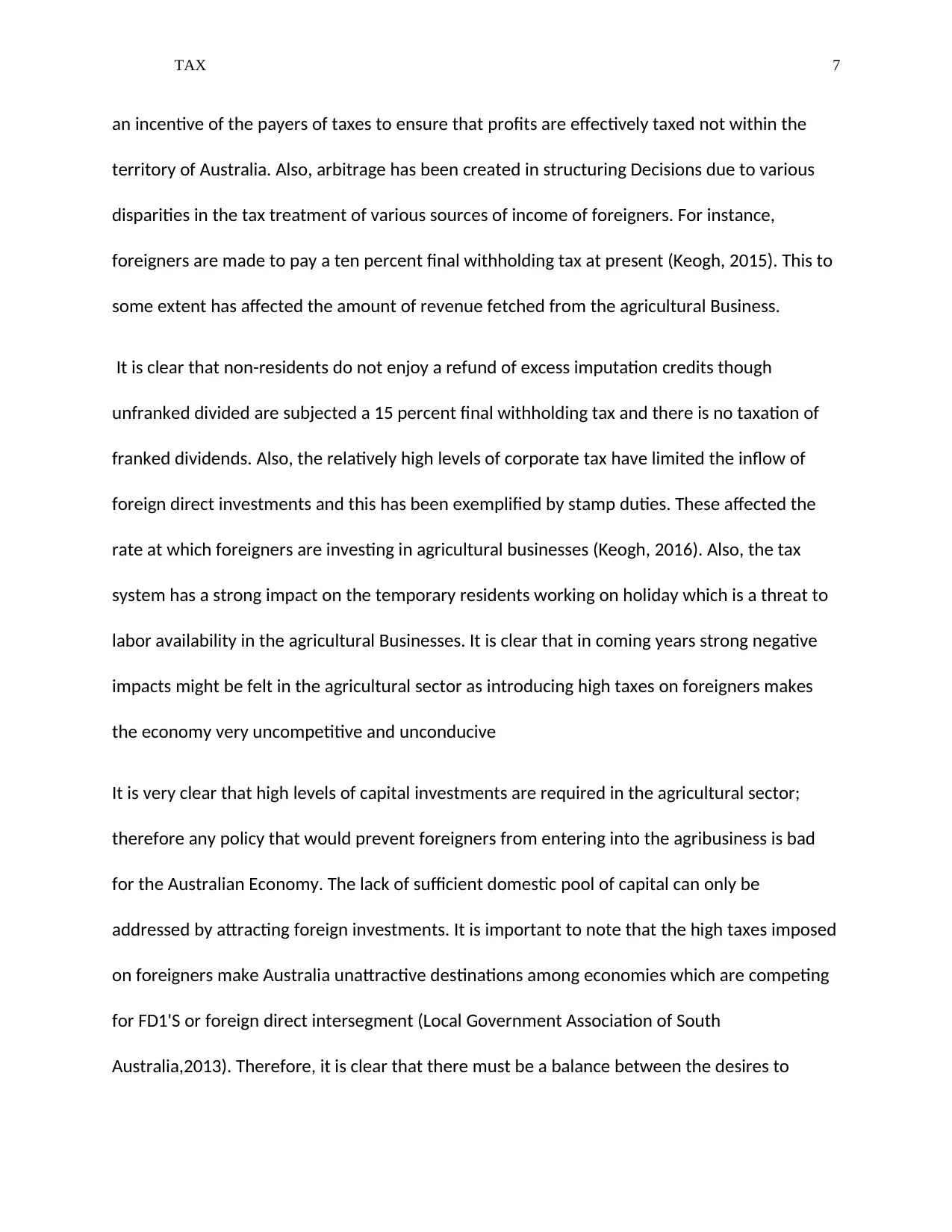
TAX 7
an incentive of the payers of taxes to ensure that profits are effectively taxed not within the
territory of Australia. Also, arbitrage has been created in structuring Decisions due to various
disparities in the tax treatment of various sources of income of foreigners. For instance,
foreigners are made to pay a ten percent final withholding tax at present (Keogh, 2015). This to
some extent has affected the amount of revenue fetched from the agricultural Business.
It is clear that non-residents do not enjoy a refund of excess imputation credits though
unfranked divided are subjected a 15 percent final withholding tax and there is no taxation of
franked dividends. Also, the relatively high levels of corporate tax have limited the inflow of
foreign direct investments and this has been exemplified by stamp duties. These affected the
rate at which foreigners are investing in agricultural businesses (Keogh, 2016). Also, the tax
system has a strong impact on the temporary residents working on holiday which is a threat to
labor availability in the agricultural Businesses. It is clear that in coming years strong negative
impacts might be felt in the agricultural sector as introducing high taxes on foreigners makes
the economy very uncompetitive and unconducive
It is very clear that high levels of capital investments are required in the agricultural sector;
therefore any policy that would prevent foreigners from entering into the agribusiness is bad
for the Australian Economy. The lack of sufficient domestic pool of capital can only be
addressed by attracting foreign investments. It is important to note that the high taxes imposed
on foreigners make Australia unattractive destinations among economies which are competing
for FD1'S or foreign direct intersegment (Local Government Association of South
Australia,2013). Therefore, it is clear that there must be a balance between the desires to
an incentive of the payers of taxes to ensure that profits are effectively taxed not within the
territory of Australia. Also, arbitrage has been created in structuring Decisions due to various
disparities in the tax treatment of various sources of income of foreigners. For instance,
foreigners are made to pay a ten percent final withholding tax at present (Keogh, 2015). This to
some extent has affected the amount of revenue fetched from the agricultural Business.
It is clear that non-residents do not enjoy a refund of excess imputation credits though
unfranked divided are subjected a 15 percent final withholding tax and there is no taxation of
franked dividends. Also, the relatively high levels of corporate tax have limited the inflow of
foreign direct investments and this has been exemplified by stamp duties. These affected the
rate at which foreigners are investing in agricultural businesses (Keogh, 2016). Also, the tax
system has a strong impact on the temporary residents working on holiday which is a threat to
labor availability in the agricultural Businesses. It is clear that in coming years strong negative
impacts might be felt in the agricultural sector as introducing high taxes on foreigners makes
the economy very uncompetitive and unconducive
It is very clear that high levels of capital investments are required in the agricultural sector;
therefore any policy that would prevent foreigners from entering into the agribusiness is bad
for the Australian Economy. The lack of sufficient domestic pool of capital can only be
addressed by attracting foreign investments. It is important to note that the high taxes imposed
on foreigners make Australia unattractive destinations among economies which are competing
for FD1'S or foreign direct intersegment (Local Government Association of South
Australia,2013). Therefore, it is clear that there must be a balance between the desires to
Paraphrase This Document
Need a fresh take? Get an instant paraphrase of this document with our AI Paraphraser
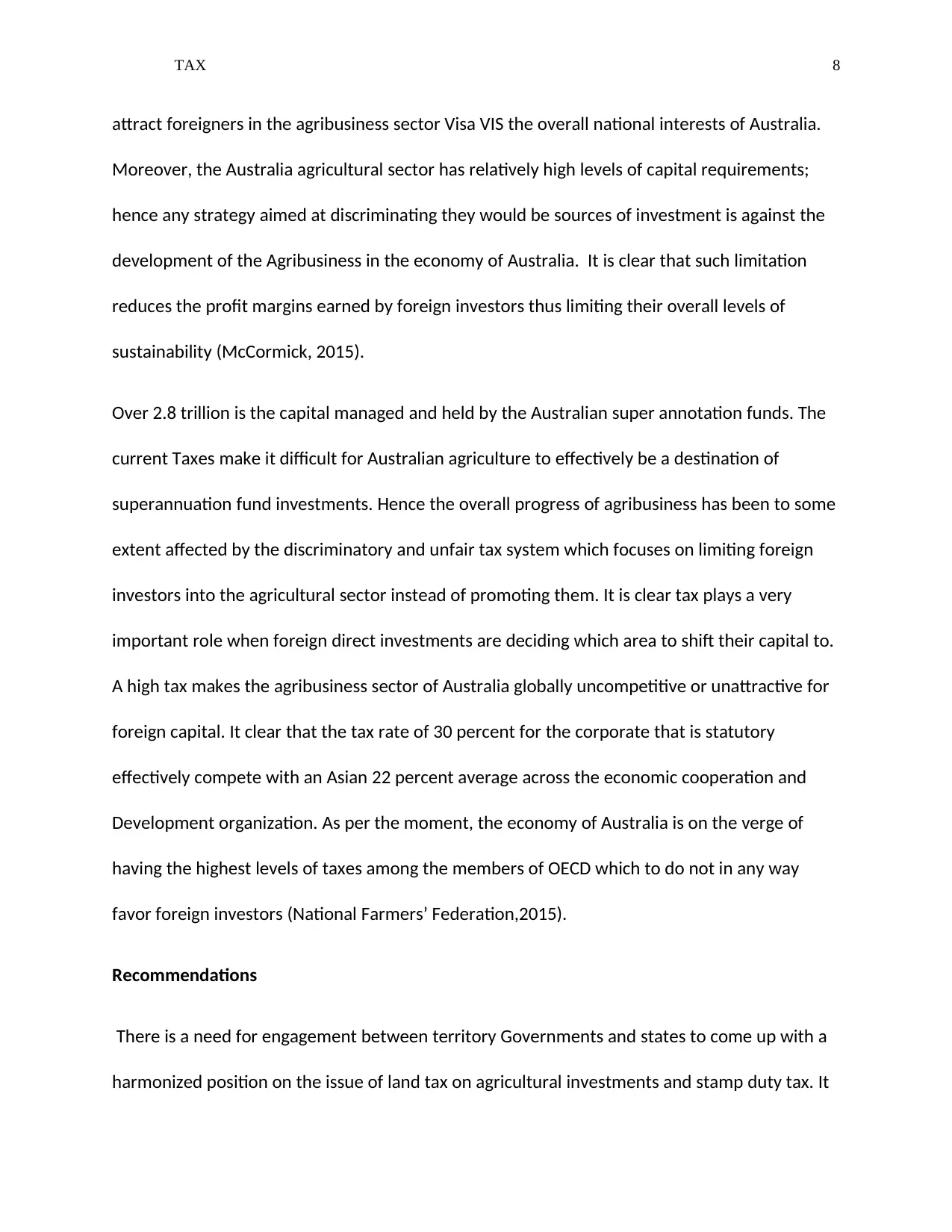
TAX 8
attract foreigners in the agribusiness sector Visa VIS the overall national interests of Australia.
Moreover, the Australia agricultural sector has relatively high levels of capital requirements;
hence any strategy aimed at discriminating they would be sources of investment is against the
development of the Agribusiness in the economy of Australia. It is clear that such limitation
reduces the profit margins earned by foreign investors thus limiting their overall levels of
sustainability (McCormick, 2015).
Over 2.8 trillion is the capital managed and held by the Australian super annotation funds. The
current Taxes make it difficult for Australian agriculture to effectively be a destination of
superannuation fund investments. Hence the overall progress of agribusiness has been to some
extent affected by the discriminatory and unfair tax system which focuses on limiting foreign
investors into the agricultural sector instead of promoting them. It is clear tax plays a very
important role when foreign direct investments are deciding which area to shift their capital to.
A high tax makes the agribusiness sector of Australia globally uncompetitive or unattractive for
foreign capital. It clear that the tax rate of 30 percent for the corporate that is statutory
effectively compete with an Asian 22 percent average across the economic cooperation and
Development organization. As per the moment, the economy of Australia is on the verge of
having the highest levels of taxes among the members of OECD which to do not in any way
favor foreign investors (National Farmers’ Federation,2015).
Recommendations
There is a need for engagement between territory Governments and states to come up with a
harmonized position on the issue of land tax on agricultural investments and stamp duty tax. It
attract foreigners in the agribusiness sector Visa VIS the overall national interests of Australia.
Moreover, the Australia agricultural sector has relatively high levels of capital requirements;
hence any strategy aimed at discriminating they would be sources of investment is against the
development of the Agribusiness in the economy of Australia. It is clear that such limitation
reduces the profit margins earned by foreign investors thus limiting their overall levels of
sustainability (McCormick, 2015).
Over 2.8 trillion is the capital managed and held by the Australian super annotation funds. The
current Taxes make it difficult for Australian agriculture to effectively be a destination of
superannuation fund investments. Hence the overall progress of agribusiness has been to some
extent affected by the discriminatory and unfair tax system which focuses on limiting foreign
investors into the agricultural sector instead of promoting them. It is clear tax plays a very
important role when foreign direct investments are deciding which area to shift their capital to.
A high tax makes the agribusiness sector of Australia globally uncompetitive or unattractive for
foreign capital. It clear that the tax rate of 30 percent for the corporate that is statutory
effectively compete with an Asian 22 percent average across the economic cooperation and
Development organization. As per the moment, the economy of Australia is on the verge of
having the highest levels of taxes among the members of OECD which to do not in any way
favor foreign investors (National Farmers’ Federation,2015).
Recommendations
There is a need for engagement between territory Governments and states to come up with a
harmonized position on the issue of land tax on agricultural investments and stamp duty tax. It
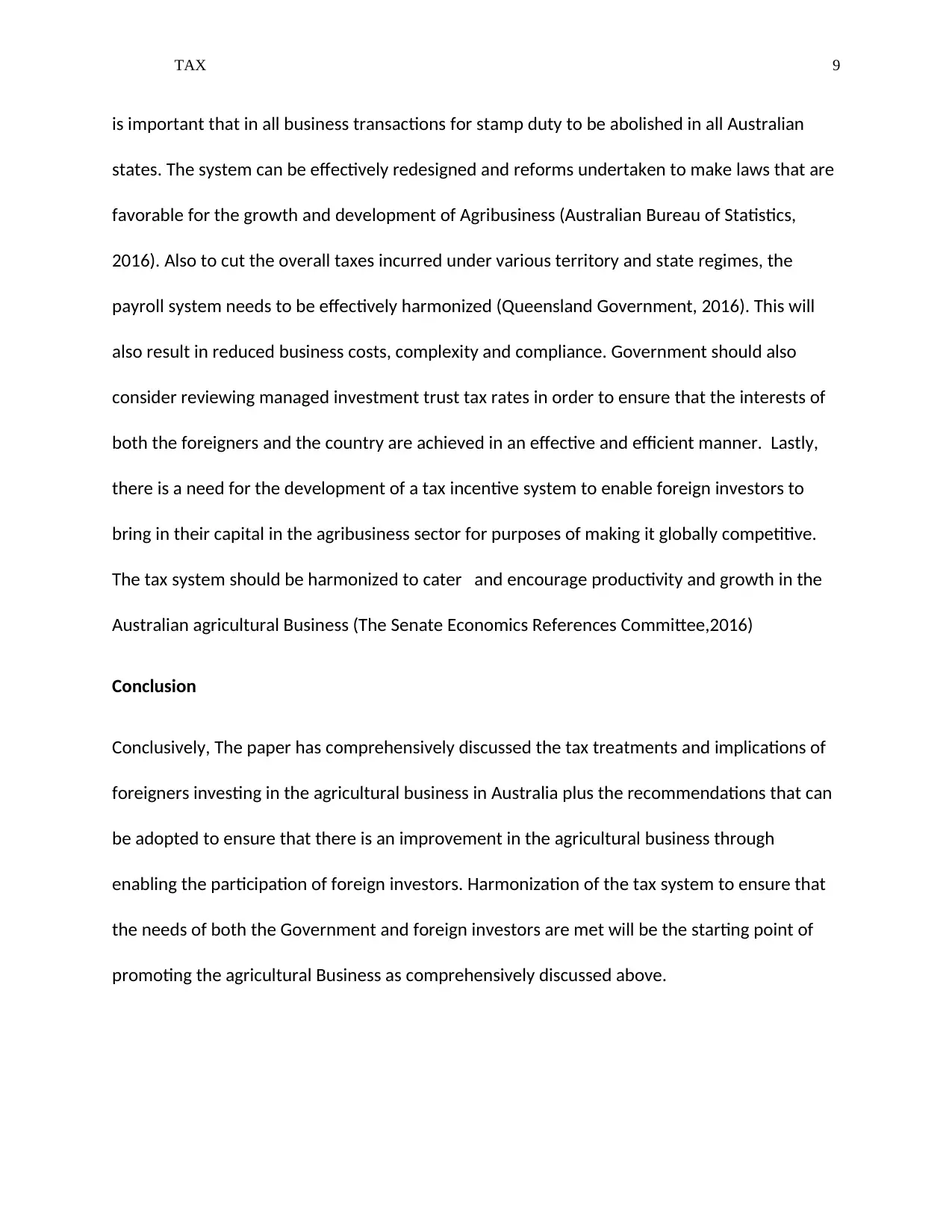
TAX 9
is important that in all business transactions for stamp duty to be abolished in all Australian
states. The system can be effectively redesigned and reforms undertaken to make laws that are
favorable for the growth and development of Agribusiness (Australian Bureau of Statistics,
2016). Also to cut the overall taxes incurred under various territory and state regimes, the
payroll system needs to be effectively harmonized (Queensland Government, 2016). This will
also result in reduced business costs, complexity and compliance. Government should also
consider reviewing managed investment trust tax rates in order to ensure that the interests of
both the foreigners and the country are achieved in an effective and efficient manner. Lastly,
there is a need for the development of a tax incentive system to enable foreign investors to
bring in their capital in the agribusiness sector for purposes of making it globally competitive.
The tax system should be harmonized to cater and encourage productivity and growth in the
Australian agricultural Business (The Senate Economics References Committee,2016)
Conclusion
Conclusively, The paper has comprehensively discussed the tax treatments and implications of
foreigners investing in the agricultural business in Australia plus the recommendations that can
be adopted to ensure that there is an improvement in the agricultural business through
enabling the participation of foreign investors. Harmonization of the tax system to ensure that
the needs of both the Government and foreign investors are met will be the starting point of
promoting the agricultural Business as comprehensively discussed above.
is important that in all business transactions for stamp duty to be abolished in all Australian
states. The system can be effectively redesigned and reforms undertaken to make laws that are
favorable for the growth and development of Agribusiness (Australian Bureau of Statistics,
2016). Also to cut the overall taxes incurred under various territory and state regimes, the
payroll system needs to be effectively harmonized (Queensland Government, 2016). This will
also result in reduced business costs, complexity and compliance. Government should also
consider reviewing managed investment trust tax rates in order to ensure that the interests of
both the foreigners and the country are achieved in an effective and efficient manner. Lastly,
there is a need for the development of a tax incentive system to enable foreign investors to
bring in their capital in the agribusiness sector for purposes of making it globally competitive.
The tax system should be harmonized to cater and encourage productivity and growth in the
Australian agricultural Business (The Senate Economics References Committee,2016)
Conclusion
Conclusively, The paper has comprehensively discussed the tax treatments and implications of
foreigners investing in the agricultural business in Australia plus the recommendations that can
be adopted to ensure that there is an improvement in the agricultural business through
enabling the participation of foreign investors. Harmonization of the tax system to ensure that
the needs of both the Government and foreign investors are met will be the starting point of
promoting the agricultural Business as comprehensively discussed above.
⊘ This is a preview!⊘
Do you want full access?
Subscribe today to unlock all pages.

Trusted by 1+ million students worldwide
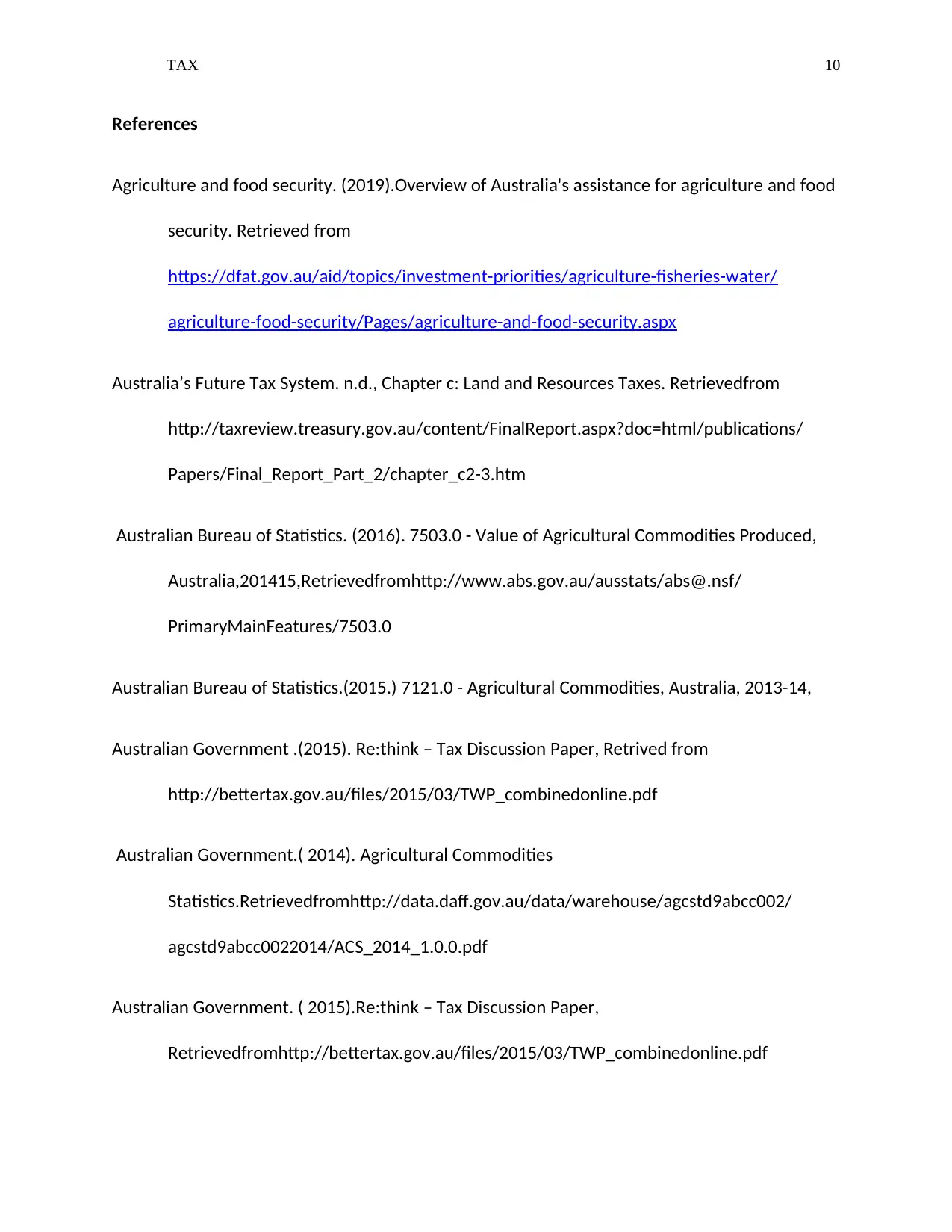
TAX 10
References
Agriculture and food security. (2019).Overview of Australia's assistance for agriculture and food
security. Retrieved from
https://dfat.gov.au/aid/topics/investment-priorities/agriculture-fisheries-water/
agriculture-food-security/Pages/agriculture-and-food-security.aspx
Australia’s Future Tax System. n.d., Chapter c: Land and Resources Taxes. Retrievedfrom
http://taxreview.treasury.gov.au/content/FinalReport.aspx?doc=html/publications/
Papers/Final_Report_Part_2/chapter_c2-3.htm
Australian Bureau of Statistics. (2016). 7503.0 - Value of Agricultural Commodities Produced,
Australia,201415,Retrievedfromhttp://www.abs.gov.au/ausstats/abs@.nsf/
PrimaryMainFeatures/7503.0
Australian Bureau of Statistics.(2015.) 7121.0 - Agricultural Commodities, Australia, 2013-14,
Australian Government .(2015). Re:think – Tax Discussion Paper, Retrived from
http://bettertax.gov.au/files/2015/03/TWP_combinedonline.pdf
Australian Government.( 2014). Agricultural Commodities
Statistics.Retrievedfromhttp://data.daff.gov.au/data/warehouse/agcstd9abcc002/
agcstd9abcc0022014/ACS_2014_1.0.0.pdf
Australian Government. ( 2015).Re:think – Tax Discussion Paper,
Retrievedfromhttp://bettertax.gov.au/files/2015/03/TWP_combinedonline.pdf
References
Agriculture and food security. (2019).Overview of Australia's assistance for agriculture and food
security. Retrieved from
https://dfat.gov.au/aid/topics/investment-priorities/agriculture-fisheries-water/
agriculture-food-security/Pages/agriculture-and-food-security.aspx
Australia’s Future Tax System. n.d., Chapter c: Land and Resources Taxes. Retrievedfrom
http://taxreview.treasury.gov.au/content/FinalReport.aspx?doc=html/publications/
Papers/Final_Report_Part_2/chapter_c2-3.htm
Australian Bureau of Statistics. (2016). 7503.0 - Value of Agricultural Commodities Produced,
Australia,201415,Retrievedfromhttp://www.abs.gov.au/ausstats/abs@.nsf/
PrimaryMainFeatures/7503.0
Australian Bureau of Statistics.(2015.) 7121.0 - Agricultural Commodities, Australia, 2013-14,
Australian Government .(2015). Re:think – Tax Discussion Paper, Retrived from
http://bettertax.gov.au/files/2015/03/TWP_combinedonline.pdf
Australian Government.( 2014). Agricultural Commodities
Statistics.Retrievedfromhttp://data.daff.gov.au/data/warehouse/agcstd9abcc002/
agcstd9abcc0022014/ACS_2014_1.0.0.pdf
Australian Government. ( 2015).Re:think – Tax Discussion Paper,
Retrievedfromhttp://bettertax.gov.au/files/2015/03/TWP_combinedonline.pdf
Paraphrase This Document
Need a fresh take? Get an instant paraphrase of this document with our AI Paraphraser
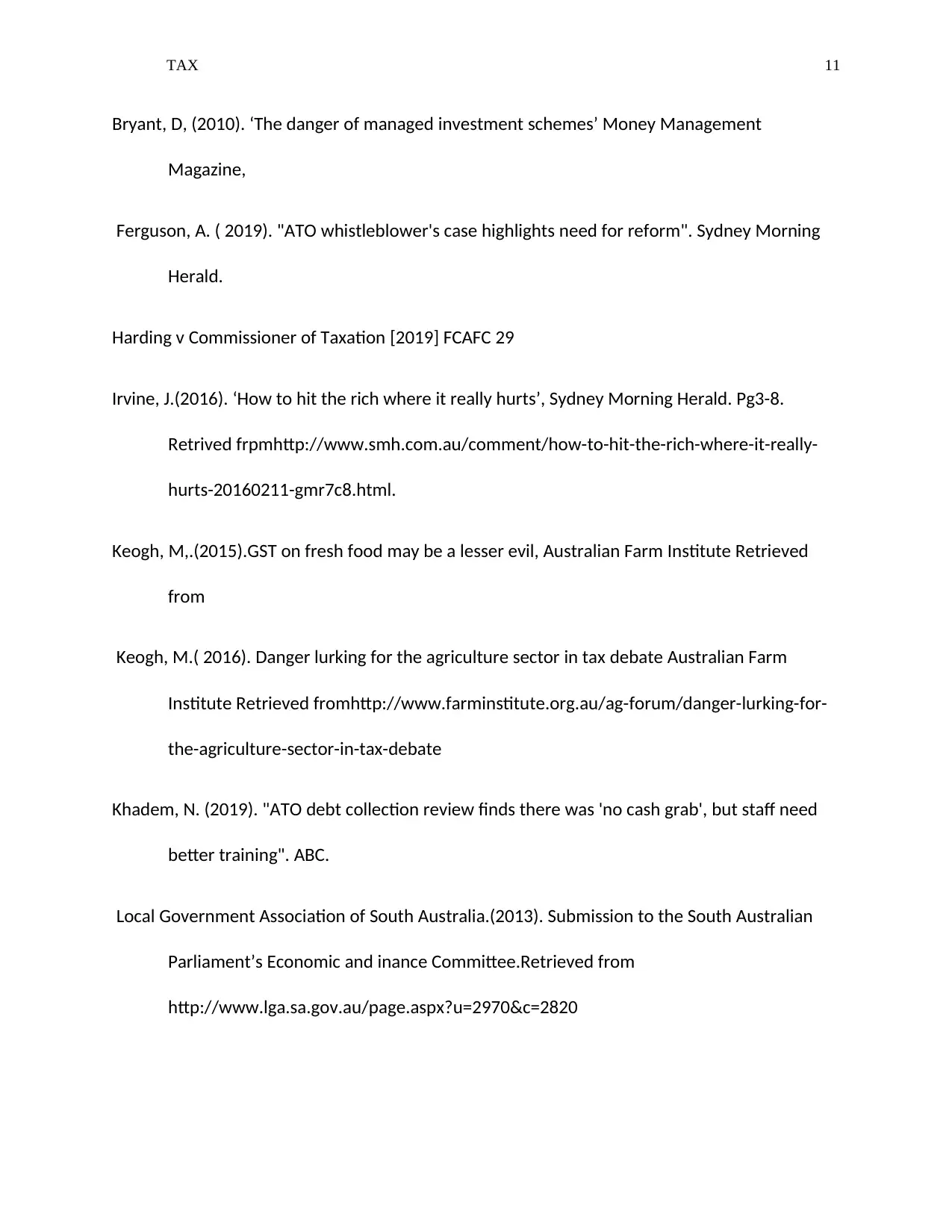
TAX 11
Bryant, D, (2010). ‘The danger of managed investment schemes’ Money Management
Magazine,
Ferguson, A. ( 2019). "ATO whistleblower's case highlights need for reform". Sydney Morning
Herald.
Harding v Commissioner of Taxation [2019] FCAFC 29
Irvine, J.(2016). ‘How to hit the rich where it really hurts’, Sydney Morning Herald. Pg3-8.
Retrived frpmhttp://www.smh.com.au/comment/how-to-hit-the-rich-where-it-really-
hurts-20160211-gmr7c8.html.
Keogh, M,.(2015).GST on fresh food may be a lesser evil, Australian Farm Institute Retrieved
from
Keogh, M.( 2016). Danger lurking for the agriculture sector in tax debate Australian Farm
Institute Retrieved fromhttp://www.farminstitute.org.au/ag-forum/danger-lurking-for-
the-agriculture-sector-in-tax-debate
Khadem, N. (2019). "ATO debt collection review finds there was 'no cash grab', but staff need
better training". ABC.
Local Government Association of South Australia.(2013). Submission to the South Australian
Parliament’s Economic and inance Committee.Retrieved from
http://www.lga.sa.gov.au/page.aspx?u=2970&c=2820
Bryant, D, (2010). ‘The danger of managed investment schemes’ Money Management
Magazine,
Ferguson, A. ( 2019). "ATO whistleblower's case highlights need for reform". Sydney Morning
Herald.
Harding v Commissioner of Taxation [2019] FCAFC 29
Irvine, J.(2016). ‘How to hit the rich where it really hurts’, Sydney Morning Herald. Pg3-8.
Retrived frpmhttp://www.smh.com.au/comment/how-to-hit-the-rich-where-it-really-
hurts-20160211-gmr7c8.html.
Keogh, M,.(2015).GST on fresh food may be a lesser evil, Australian Farm Institute Retrieved
from
Keogh, M.( 2016). Danger lurking for the agriculture sector in tax debate Australian Farm
Institute Retrieved fromhttp://www.farminstitute.org.au/ag-forum/danger-lurking-for-
the-agriculture-sector-in-tax-debate
Khadem, N. (2019). "ATO debt collection review finds there was 'no cash grab', but staff need
better training". ABC.
Local Government Association of South Australia.(2013). Submission to the South Australian
Parliament’s Economic and inance Committee.Retrieved from
http://www.lga.sa.gov.au/page.aspx?u=2970&c=2820
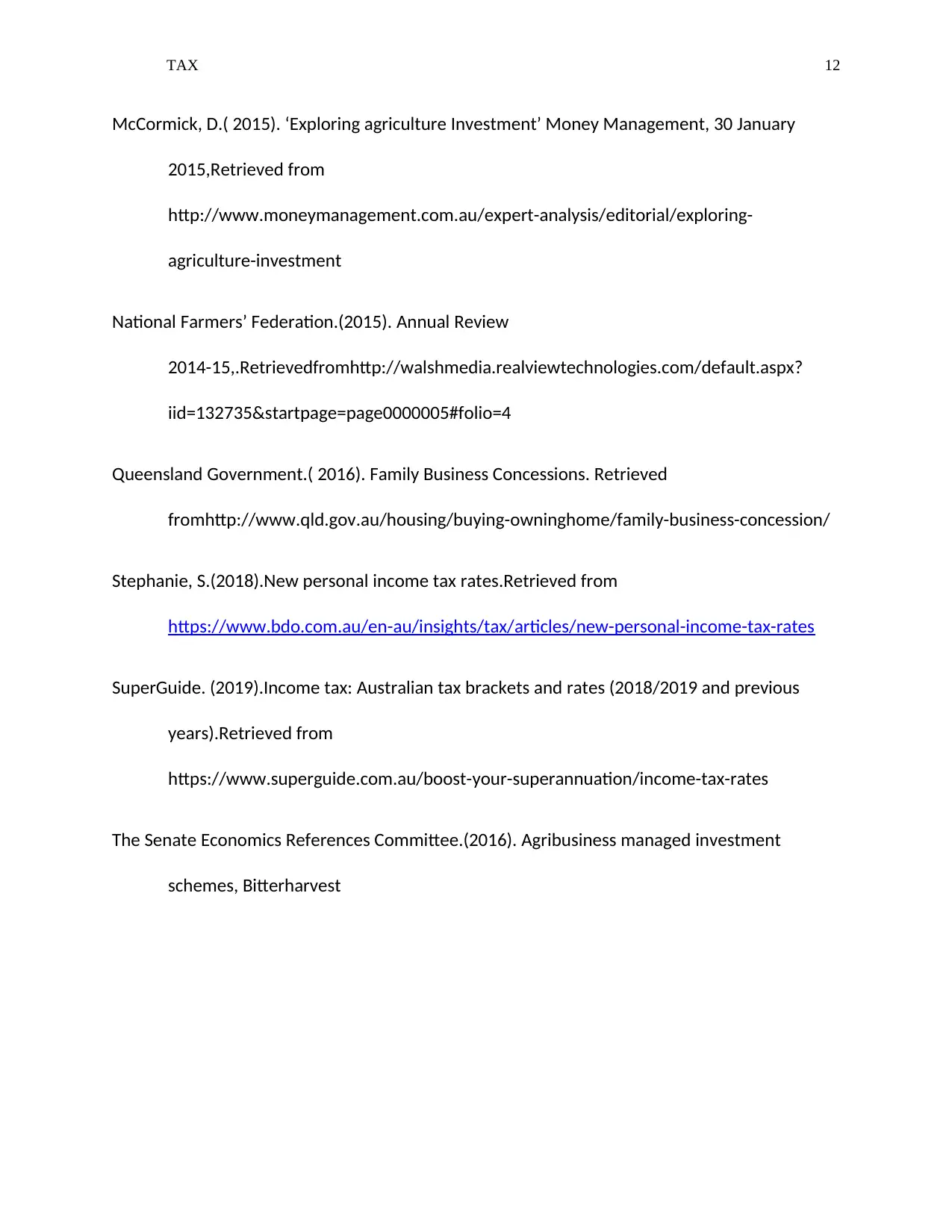
TAX 12
McCormick, D.( 2015). ‘Exploring agriculture Investment’ Money Management, 30 January
2015,Retrieved from
http://www.moneymanagement.com.au/expert-analysis/editorial/exploring-
agriculture-investment
National Farmers’ Federation.(2015). Annual Review
2014-15,.Retrievedfromhttp://walshmedia.realviewtechnologies.com/default.aspx?
iid=132735&startpage=page0000005#folio=4
Queensland Government.( 2016). Family Business Concessions. Retrieved
fromhttp://www.qld.gov.au/housing/buying-owninghome/family-business-concession/
Stephanie, S.(2018).New personal income tax rates.Retrieved from
https://www.bdo.com.au/en-au/insights/tax/articles/new-personal-income-tax-rates
SuperGuide. (2019).Income tax: Australian tax brackets and rates (2018/2019 and previous
years).Retrieved from
https://www.superguide.com.au/boost-your-superannuation/income-tax-rates
The Senate Economics References Committee.(2016). Agribusiness managed investment
schemes, Bitterharvest
McCormick, D.( 2015). ‘Exploring agriculture Investment’ Money Management, 30 January
2015,Retrieved from
http://www.moneymanagement.com.au/expert-analysis/editorial/exploring-
agriculture-investment
National Farmers’ Federation.(2015). Annual Review
2014-15,.Retrievedfromhttp://walshmedia.realviewtechnologies.com/default.aspx?
iid=132735&startpage=page0000005#folio=4
Queensland Government.( 2016). Family Business Concessions. Retrieved
fromhttp://www.qld.gov.au/housing/buying-owninghome/family-business-concession/
Stephanie, S.(2018).New personal income tax rates.Retrieved from
https://www.bdo.com.au/en-au/insights/tax/articles/new-personal-income-tax-rates
SuperGuide. (2019).Income tax: Australian tax brackets and rates (2018/2019 and previous
years).Retrieved from
https://www.superguide.com.au/boost-your-superannuation/income-tax-rates
The Senate Economics References Committee.(2016). Agribusiness managed investment
schemes, Bitterharvest
⊘ This is a preview!⊘
Do you want full access?
Subscribe today to unlock all pages.

Trusted by 1+ million students worldwide
1 out of 12
Related Documents
Your All-in-One AI-Powered Toolkit for Academic Success.
+13062052269
info@desklib.com
Available 24*7 on WhatsApp / Email
![[object Object]](/_next/static/media/star-bottom.7253800d.svg)
Unlock your academic potential
Copyright © 2020–2026 A2Z Services. All Rights Reserved. Developed and managed by ZUCOL.



